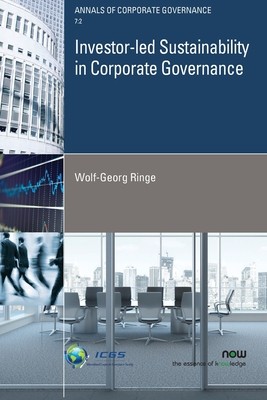
- We will send in 10–14 business days.
- Author: Wolf-Georg Ringe
- Publisher: Now Publishers
- ISBN-10: 1638281068
- ISBN-13: 9781638281061
- Format: 15.6 x 23.4 x 0.4 cm, minkšti viršeliai
- Language: English
- SAVE -10% with code: EXTRA
Investor-Led Sustainability in Corporate Governance (e-book) (used book) | bookbook.eu
Reviews
Description
Investor-led Sustainability in Corporate Governance argues that ESG engagement can be a very powerful driver towards a more sustainability-oriented future in corporate governance. Investor-led sustainability has many advantages compared to a more prescriptive, regulatory approach. For example, a greater focus on investor initiatives would follow a more flexible and dynamic pattern rather than complying with pre-defined criteria that are slow to change. Moreover, investor-promoted assessments are not likely to impair welfare creation in the same way as ill-defined legal standards; they would also not trigger regulatory arbitrage and would avoid deadlock situations in corporate decision-making. Any regulatory responses should then be limited to a facilitative and supportive role. This monograph proceeds as follows: Section 2 traces the recent trend towards increased ESG and sustainability in corporate governance and finance, and in particular documents the rise of investor-led initiatives in this field. Section 3 discusses the merits of such shareholder engagement and makes the case that ESG initiatives pursued by investors are consistent with business realities and conform with market logic of both demand and supply. Section 4 turns to the main advantage of ESG engagement, namely that it increasingly relies on coalitions and team-building between different types of institutional investors. It is presented that these teaming-up strategies have a dual benefit and a double genius in that they give greater support to campaigns, but also serve as an in-built screening mechanism that would exclude the realization of idiosyncratic benefits for individual investors. Sections 5 and 6 develop some regulatory implications and conclude the analysis.EXTRA 10 % discount with code: EXTRA
The promotion ends in 23d.18:32:29
The discount code is valid when purchasing from 10 €. Discounts do not stack.
- Author: Wolf-Georg Ringe
- Publisher: Now Publishers
- ISBN-10: 1638281068
- ISBN-13: 9781638281061
- Format: 15.6 x 23.4 x 0.4 cm, minkšti viršeliai
- Language: English English


Reviews